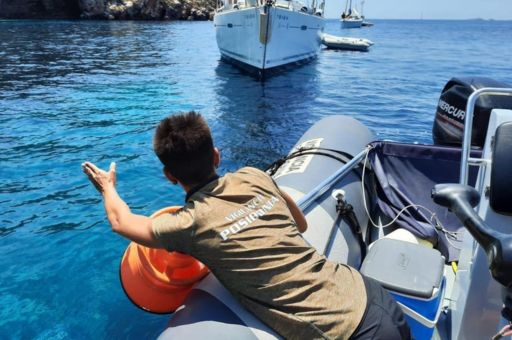The service begins on May 15 with one vessel per island and will reach full deployment on June 1, totalling 20 boats—one more than last year.
Joan Simonet: “The Government reaffirms its commitment to marine conservation and protection, institutional coordination, and the sustainability of the nautical sector.”
The Balearic Government, through the Balearic Institute of Nature (IBANAT) under the Directorate-General of Natural Environment and Forest Management, is launching a new season of the Posidonia Surveillance Service. This key program aims to protect the marine seagrass Posidonia oceanica, ensure responsible coastal usage, and reduce anchor-related impacts on the seabeds.
TDB keeps you informed. Follow us on: Facebook, Twitter and Instagram
Posidonia Surveillance Service Begins the Season with New Technology to Boost Operational Efficiency
The major innovation in 2025 is the incorporation of real-time detection technologies using the Automatic Identification System (AIS), which enhances efficiency, anticipates risks, and optimises patrol routes. “This development strengthens the preventive nature of the Service and consolidates the Balearic Islands’ leadership in seabed protection,” emphasised Joan Simonet, Minister of Agriculture, Fisheries and Natural Environment.
The deployment of the Posidonia Surveillance Service will be gradual: starting on May 15 with one vessel per island, reaching full operation on June 1 with 20 vessels in total, one more than in 2024. The service will run until October 10 and will be distributed across the territory as follows: six boats in Mallorca, five in Formentera, four in Ibiza, and five in Menorca (including one vessel from the Island Council of Menorca and continued support from the Natural Park of s’Albufera des Grau).
“With this service, the Government reaffirms its commitment to marine conservation, institutional coordination, and the sustainability of the nautical sector,” Simonet noted. He emphasised that the main goal is to prevent anchoring on Posidonia meadows through information, assistance, and, when necessary, relocation of vessels. This impact reduction method—considered passive restoration—is only practised in the Mediterranean by the Balearic Islands and the Valencia Region.
The Posidonia Surveillance Service is part of Operativo Posidonia, which brings together resources from the Balearic Government, Island Councils, municipalities, Environmental Agents, Ports of the Balearic Islands, Maritime Civil Guard, TRAGSA, and other entities. The program includes the Posidonia Hotline (+34 617 975 172), the atlasposidonia.com mapping portal, the Posidonia Monitoring Network, public outreach campaigns, and the management of ecological mooring fields, led by the Ports of the Balearic Islands.
The service is funded by the Balearic Government with support from Next Generation EU funds under the Recovery, Transformation and Resilience Plan.
It’s worth noting that during the 2024 season, the service carried out 129,497 operations, inspected 99,154 anchorages, and relocated 6,764 vessels that were improperly anchored. The overall rate of non-compliance stood at 6.8%, with Formentera leading in best practices, showing only 1% incorrect anchoring.
